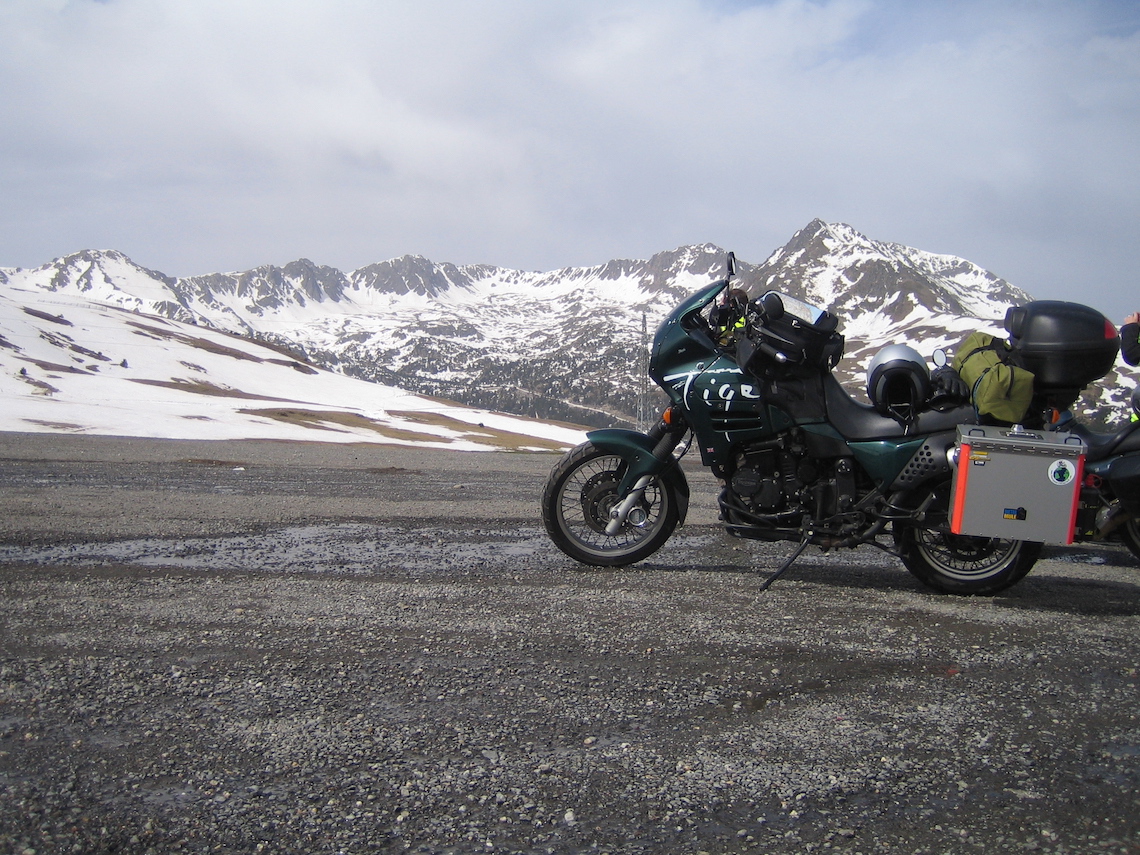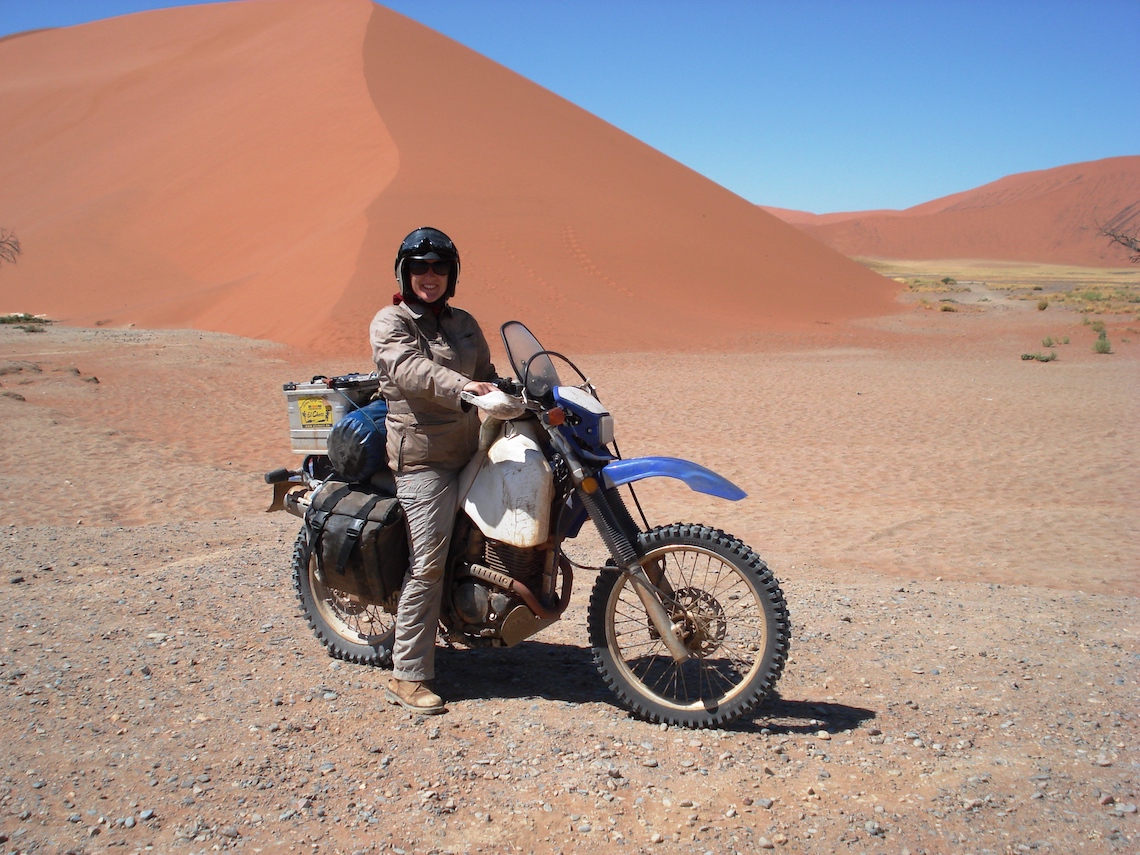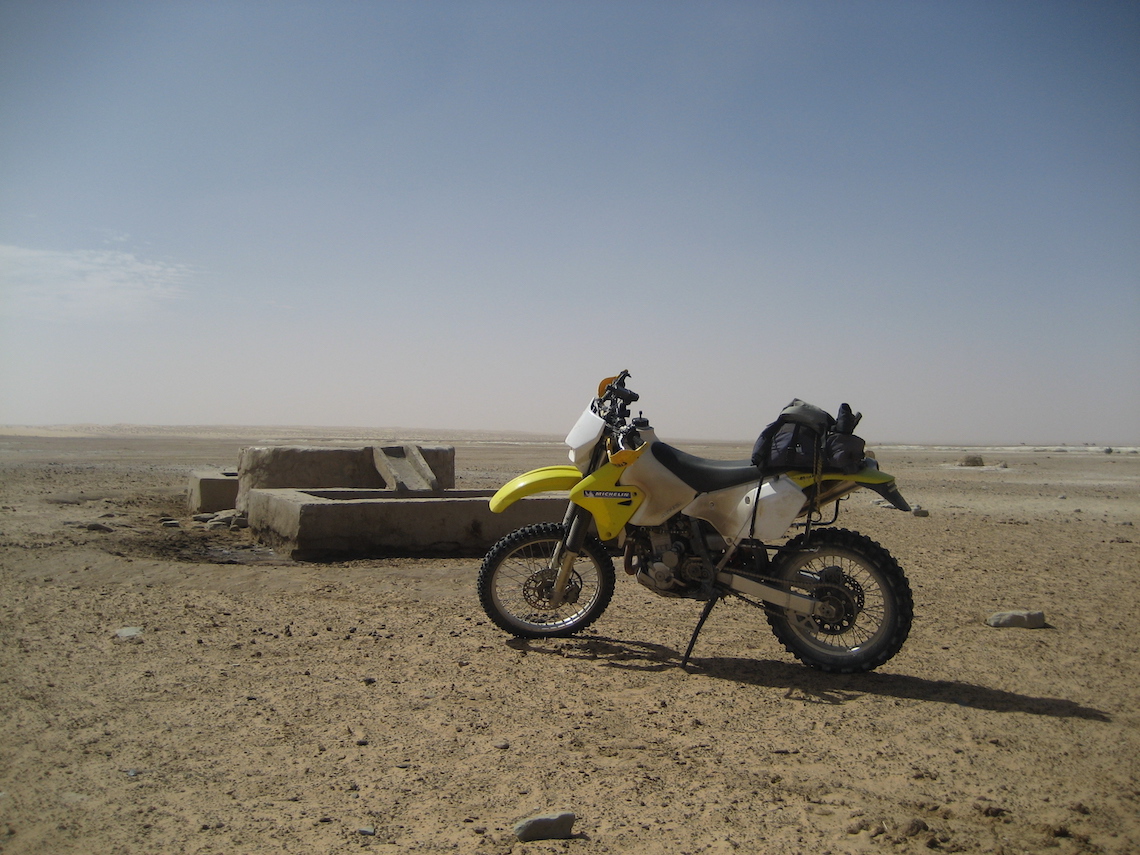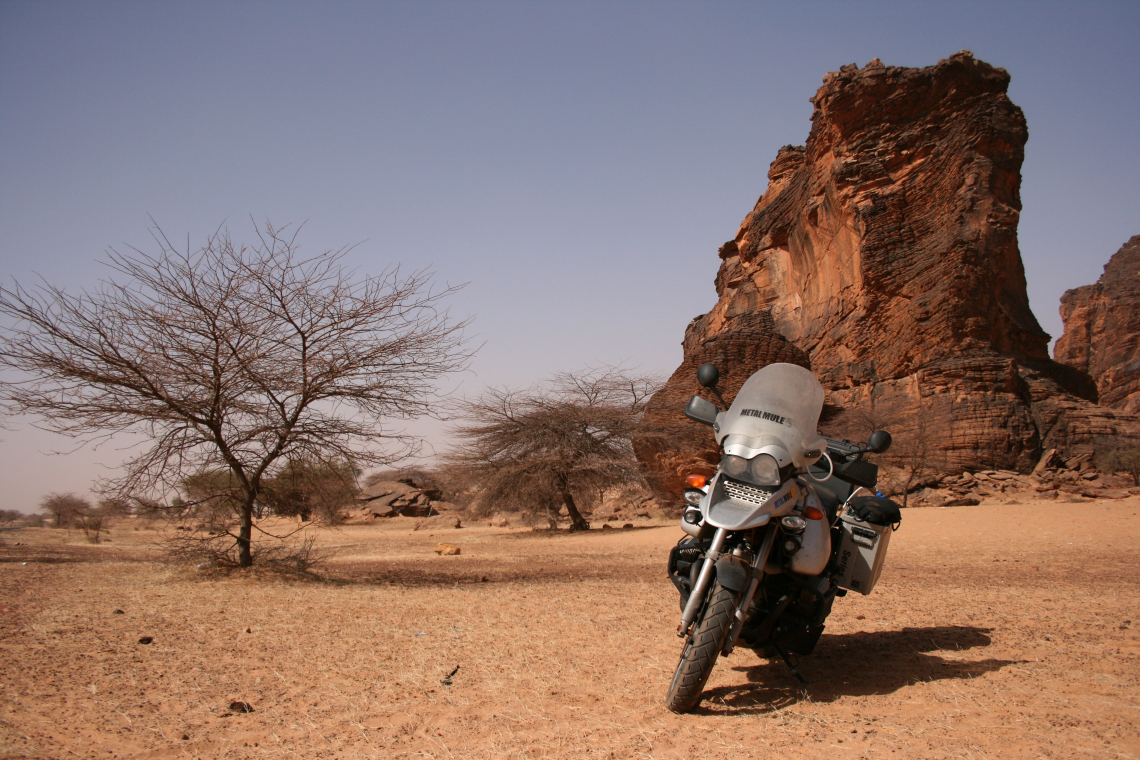PEACE OF MIND PART 1
Planning an epic adventure isn’t always as simple as packing up your panniers and escaping into the sunset. Sam Manicom has some suggestions for tackling the tricky subject of responsibility…
When ABR asked me to do an article for readers who’s feet are itching to travel but face the problems of most, my first thought was, ‘Good grief! I’m not the right person to be writing about this.’
The truth is I didn’t have to face the usual hassles of family ties and responsibilities when I set out on my motorcycle adventure. My mother and my sisters were all well; I wasn’t married and I didn’t have any kids either. I didn’t owe anyone any money and it occurred to me that if I could get the loot together, I could do something quite different. I felt so lucky, in fact, that I considered it daft not to learn to ride a motorbike and just go. The reality is I had it easy.
Then I started thinking about the realities for those who haven’t found all the pieces of the jigsaw slotting into place; all the campfire conversations I’ve had with other overlanders during the course of my time on the road. Each had faced problems making their dream trip happen, but they’d also evolved their own solutions, too. One of the common subjects of conversation was the feeling of guilt that sometimes affects a day’s adventuring.
HOME TRUTHS
When you head off, you’d expect the pure buzz of excitement wouldn’t you? Along with a dash of trepidation perhaps. But many overland adventures seem to start off with these sensations being tinged with guilt. This feeling often stems from the concerns that anyone with commitments will have. Also threaded into the weave, there’s a sense of disbelief that a person has been lucky enough to be able to head off on a dream adventure.
Firstly, that feeling of disbelief is a marvellous thing and should never be allowed to go away. If it remains with you for the duration of your trip, everything you see will be sharp-edged with appreciation. But the battle with commitments needs to be dealt with straight away, or they’ll taint the adventure. When you’re on the road, you’ll want to wake up to each dawn with the glorious question in mind: ‘What shall I do today?’ and not, ‘I wonder what’s happening with…’ or ‘I wish I’d handled that better.’
If you’re at the big-itch stage and that itch just has to be scratched, then you’ll probably have already asked yourself if it’s actually fair to leave your family and go. This has to come down to individual circumstances and who the people in your family are. My feeling is that if your overlanding desire is that strong then family life will suffer if this desire just fizzles at the back of the hearth. You’ll be living your life knowing that something important is missing, and your family will know that too.
So, should you feel guilty for wanting to go? I don’t think you should. The guilt only needs to be there if you aren’t making the best possible plans with your family for the time that you’re away. Before I get shouted at, though, I want to make it known that I’m very conscious some people simply cannot get away, people whose weight of responsibility is such that there’s no way they can escape and bring their dreams to life. I do commiserate with those people and can only say, keep the flame burning. Keep dreaming and keep your eyes open for the chance to go, because none of us knows what tomorrow will bring.
BEST MADE PLANS
Here’s another thought for you: is there a best time in life to set off on an adventure? I’d say very simply, no. Your age matters less than the fact that you should actually go. If you wait until later in life, your years of experience will give you the chance to see and value more of the things you’ll come across on your travels. Birgit and I have a Danish friend, Gunnar, who rode the length of Africa once he’d retired. His comment was, “I don’t go as fast as you young people, but I see more.” Good point. If you’re lucky enough to go earlier in life, you’ll be able to take full advantage of this life-changing experience. I once met a 17-year-old French runaway who’d been on the road for three years. Talk about level headed! She smiled a lot too.
Thirty years ago, if you wandered the world having adventures you were some sort of dope-smoking hippy. Nowadays, gap years are so normal that many employers don’t look badly at you if you’ve had an adventure; in fact, many value employees who’ve had a bit of world experience. You can also turn your travels to your advantage in making yourself stand out in interviews, too, by thinking about every aspect of your adventure that could be useful to the employer.
One of my frequent on-the-ride thoughts is that it’d be a fine thing if everyone aged 25 should have to take a sort of gap year. Put very simply, if those on the year out had to work in a third world country for six months and then could travel for six months, the things learnt and shared would make the world a far less prejudiced and more fun place. It would be a great prospect for international and business relations if handled properly!
The opportunity to escape can come in all sort of unlikely guises. I have friends who’ve been made redundant over the last couple of years. Instead of falling into a pit of gloom and self doubt, they’ve set off to live the dream, knowing that this might well be the best chance they will ever have. The moral there is keep your eyes open for the unexpected chance to go.
But what do you do if you’re bang-slap in the midst of a career? Inevitably, the more commitments you have the harder it’s going to be to keep each of them happy. Sooner or later I suspect that you’ll have to make some compromises. But the key is that you can still head off. Life is full of compromise – and life on the road is very full of it. Almost nothing ever runs smoothly out there and whenever a problem occurs then compromise is usually required before a solution is found. So the secret is to treat these situations as just good training for the sort of things you’ll be dealing with on your travels.

Photo: Sam Manicom
THE SUM OF ALL FEARS
So just how do you leave your family and commitments for as much time as, say, six months? Of course, your family will have to agree to you going in the first place. They need to be committed to helping you have your adventure. If they do agree, and send you off with their blessings, thank them for the gift and go for it. But make life as easy as possible for them while you are away – more on that in a minute. What if you’ve had to cajole and the ‘permission’ has been grudgingly given? Well, then you have to be even more sensitive and pull your mind out of your dream for a while. Ask yourself these questions: What are their deepest fears? What will make your absence easier to deal with? These questions matter whether it’s a spouse or a parent you’re thinking about.
Family fears will almost certainly include danger, the risk factor, dealing with breakdowns, keeping well and being able to stay in touch. In times of disaster, speedy contact can be absolutely vital. If you’ve done your homework, though, your family will be able to see that you’re setting out very much aware of the dangers and the risks – forewarned is forearmed. And they will also be able to see how you plan to deal with the eventualities you can anticipate. Don’t forget that scare stories are often just that. Being in the wrong place at the wrong time and actually doing the wrong thing is unlikely if you have a normal level of common sense, and you’re sensitive to your surroundings.
They’ll also no doubt be wondering how they’ll cope without you. After all, in a marriage you’ll have been 50 percent of the partnership. That’s a sudden and rather huge void. When my partner Birgit is away for just a couple of weeks I tend to feel decidedly out of kilter. She tells me that she feels the same when I’m away, too.
The first step is to talk a little, and listen. Birgit suggests telling your partner what your dream is and listing the things you’d like to do. Once you’ve done this, give them time to think about these desires before you sit down and discuss the implications of the trip any further. This will give your partner time to work out what they actually feel and consider their own questions and concerns before putting them to you.

Photo: Sam Manicom
Make a time to chat about it when there will be no other distractions and try to keep a very open mind; also be prepared to listen hard. You may be surprised to hear some of your partner’s fears and concerns, however well you know them. Try to remember that even if their fears seem irrational or unfounded, they are still very real fears for them and should be addressed with equal respect.
CONJUGAL VISITS
Depending on where you’re planning to go, your family could come out and meet you along the way. I was book signing up at the NEC recently and a couple asked me about this. He wanted to do a big adventure, to ride from the UK down to South Africa, but she didn’t ‘do’ tents, or dirty showers, or two wheels on dirt roads, etc. The two of them had obviously talked long and hard about it and I could see sadness in his eyes, and a tinge of guilt in hers. Both their eyes lit up when I suggested that she should fly out to Zanzibar, three months into his trip.
This island off the coast of Tanzania has excellent resorts of all budgets, white sandy beaches, turquoise seas, great food, the spice plantations to explore and the influence of cultures ranging from the Brits to Arabs to Indians – it’s all there in the food, the language and the buildings. And if she was feeling like another type of adventure, she could tag on a safari or two. The three months would allow plenty of time for her husband to get as far as Tanzania without putting himself in unnecessary danger by trying to travel too fast, or making him ride quickly past the things that are, after all, part of the point of a big trip. At the six-month stage she could fly down to Cape Town to be there at the end of the trip and to enjoy a completely different taste of Africa, but in a way which would still satisfy his and her needs. I hope I planted a seed there…

You could also try this arrangement in reverse, by that I mean you could fly home a couple of times during your trip. From a purely selfish point of view, I think you shouldn’t. Part of being on an overlanding adventure is the fact that you have time to come down from the rush of modern life at home. It normally takes me at least six weeks before I stop waking up with a feeling that I have to get a move on. I find I’ve slipped into ‘on the road’ mode when, without thinking about it, I’ve made a decision to stay an extra week in a place or take an unplanned side turning just because there’s no reason why I shouldn’t. That moment is the point when I know at last I’m free.
There are also the laws of individual countries to consider. You’ll be entering them using a carnet for your bike most of the time, and when you aren’t then you’ll be buying temporary importation papers at the borders or at least having your bike stamped into your passport. Either way, most countries don’t allow you to leave while your bike is still there.
If a six-month chunk out of life is simply too much ask, why not split your dream RTW trip into a lifetime of shorter adventures? A mate of mine, Mark, has done just that and I think he’s got this adventuring lark sussed. Not only has he had a lifetime of dream motorcycle trips, he’s payed off his mortgage and filled his garage with a stable of bikes!
TWO’S COMPANY, THREE’S AN EDUCATION
All this is coming from the assumption that your partner wants to stay at home while you travel. But what if you find that your partner wants to come with you? If you have kids, it may not be possible for you both to go. There’s their health and education to think of, though I should just plant a quick idea in your mind here – what about taking the kids too? I bet the education you and your partner could give your children during six months on the road would be more than equal to anything they can learn in school, if you handle it right. You’d probably even find that your kid’s schools would encourage the idea.
Birgit and I have met several families out on the road. One family was on a BMW R80GS and sidecar. The bike was set up for off-roading, so they were able to get to some really rugged places. They downloaded school lessons over the internet, but in the main they concentrated on teaching their children about the history, geography, culture and politics of each country they travelled through. The idea takes a bit of preparation and some of your time along the way, but I bet it pays you dividends. Quality time with the whole family and no TV or computer games to get in the way – imagine that? If nothing else I bet you’d find out more about the countries you’re visiting than you would if you were on your own.

Photo: Sam Manicom
Sam Manicom travelled the world for eight years and 200,000 miles. He is the author of adventure motorcycle travel books, Into Africa, Under Asian Skies, Distant Suns and now his new book Tortillas to Totems. Available from www.sam-manicom.com, and all good travel bookshops. Ebook versions of these titles are now available to buy online, too


